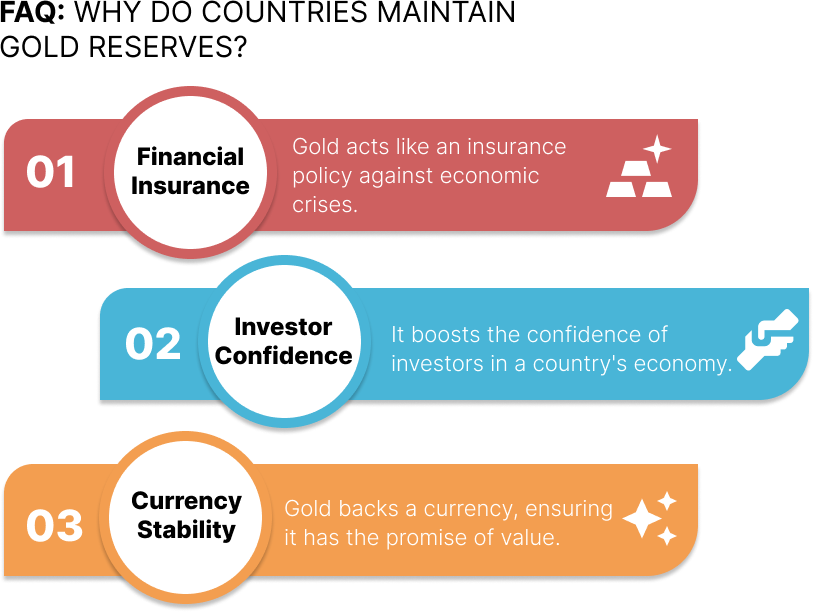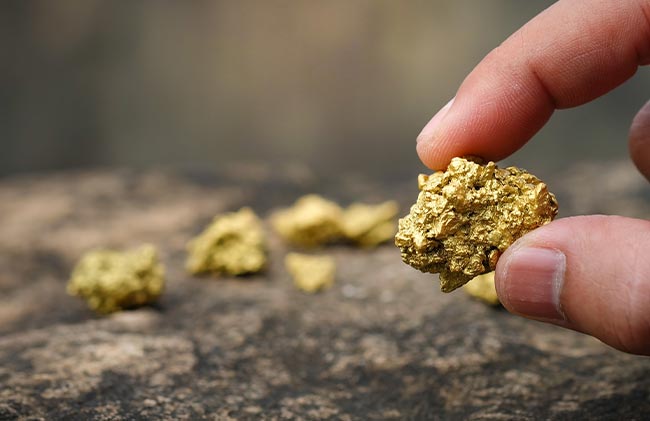Gold Reserves - Mining, Prices, and Geopolitical Events

Ever wondered what's behind the allure of gold reserves? It's not just about wealth and opulence; gold reserves are a cornerstone of financial stability and backing for countries around the world.
In this article, we’ll look into why nations covet gold and how gold reserves impact the global economy.
What Are Gold Reserves?
Picture a large vault filled with bars, all stamped with a seal of authenticity. In essence, gold reserves are the amount of gold kept by central banks or governments to back up their currency, support their economies, and ensure there's a safety net during economic uncertainty.
Countries stack up on gold for several reasons. Gold acts like a financial insurance policy: when things get a little rocky in the global economy, gold tends to hold its value.
Here's something intriguing: The USA holds the largest stockpile of gold reserves in the world- nearly 8,133.5 tonnes, according to the World Gold Council, whilst the UK has over 300 tonnes of gold reserves to its name.
.png)
If you're into investing or just keen on global finance, understanding gold reserves is key to understanding a country's economic strength. When gold prices are soaring, it can indicate that investors are seeking refuge amid economic uncertainty. If you're curious about how you can invest in gold, companies like The Gold Bullion Company can help you. Whether it's buying coins or bars, it's not just a symbol of wealth; it's a piece of financial stability that you can hold in your hand.
Importance of Gold Reserves
Economic Stability
When a country's economic waters get choppy, gold serves as a life raft. For example, during times of high inflation, gold often retains its value better than currency does.
Gold reserves are also reassuring for investors. When they see a country with substantial gold reserves, they feel more confident about putting their money there. And in the world of investments, confidence is everything. This security attracts investments and encourages economic growth, proving the sheer importance of gold reserves.
Currency Backing
The backing that reserves provide to a currency is undeniable. Consider the British pound; it's one of the most stable currencies worldwide. Part of the reason lies in the UK's gold reserves. They act like a promise that the pound is valuable. If things go wrong with the currency, the gold is still there. It's like a pledge that the currency carries genuine value.
Gold reserves represent a tangible commitment that a country can convert its currency into something of universal value, at any given time. It gives the currency a 'gold standard,' which even though isn't used anymore, is a historical reference point for a strong currency. Banks around the world hold reserves in gold, confirming its continued importance in backing currencies.

Countries with the Largest Gold Reserves
In our exploration of gold reserves, it's interesting to see which nations lead the pack. These countries not only have substantial amounts of this precious metal but their holdings contribute significantly to their economic clout.
United States
Sitting at the top with the largest stash, the US is reputed to have over 8,000 tonnes of gold. The majority of it is tucked away in the famous Fort Knox, as well as other locations across the country, like the Federal Reserve Bank of New York.
Germany
Moving over to Europe, Germany holds its own with one of the biggest reserves. They've got around 3,000 tonnes of gold. After the Second World War, Germany started accumulating gold to bolster its economy.
Italy
Next up is Italy, another European country, holding a little less than Germany at 2400 tonnes. It is part of their strategy to keep the economy stable and confident. They consider their gold reserves as a sort of economic safety net.
France
France is roughly in the same league as Italy. French gold is spread across various locations within the country, and they view it as a vital reserve asset. The Banque de France plays a significant role in managing this precious resource.
China
China’s reserves have been growing rapidly, and now they have over 2,200 tonnes of gold. China has been quite secretive about their exact numbers in the past, so when they update their figures, it often makes waves in the financial world.
Russia
Russia has been aggressively increasing its gold reserves. They're doing this as part of a move to de-dollarize their economy. Current Russian holdings are listed as 2,300 tonnes.
Here's a quick FAQ about gold reserves:
- How often are gold reserves updated? - Countries update their gold reserves data regularly, typically monthly, and the information is accessible on their respective central bank websites.
- Where do countries store their gold reserves? - Most countries store their gold domestically in secure locations like central bank vaults. Some also opt for international storage options, like the Bank of England or the Federal Reserve Bank of New York.
- What impacts can changes in gold reserves have on the economy? - Fluctuations in gold reserves can affect currency value, inflation rates, and national credit ratings. They serve as a barometer for a country's economic health.
To stay up-to-date with the latest stats from these nations, make sure to visit reliable sources such as the World Gold Council, or the respective central banks. It's always enlightening to see how these gold reserves uphold our global economy.
How Gold Reserves are Managed?
Central Banks
Central banks often use the gold reserves for several key purposes:
- To stabilise the national currency: Gold acts as a hedge against inflation and currency devaluation.
- Support monetary policy: It's a tool to influence their country's economy.
- Secure assets: In times of economic uncertainty, gold is a safe haven asset.
Each central bank has its own strategy for managing their gold reserves, which could involve buying or selling gold to control its effects on the market. For instance, they might buy more gold when they want to strengthen their economic position. And sometimes, they have to report their gold activities, like sales and purchases, to the World Gold Council, which gives a clearer picture of the global gold market.
These depositories ensure the gold is secure and ready for transactions between countries and institutions. They're incredibly secretive about the exact details of the gold they store, for obvious security reasons.
International Monetary Fund (IMF)
When we talk about the management of gold reserves on a global scale, the International Monetary Fund (IMF) is a key player. They hold a big proportion of the world's gold, and here's a summary of what they do with it:
- Financial Support: They sell gold to fund loans for member countries in need.
- Policy Oversight: The IMF also monitors and advises on international monetary and financial stability.
It's worth noting that the IMF's gold policies can influence global gold prices and economic decisions in member countries.
FAQs
- Are gold reserves public information? - Mostly, yes. Central banks and the IMF regularly report their gold holdings. However, the exact locations and security measures of depositories aren't disclosed.
- Can I visit a gold depository? - No. These places are high-security areas, so public access is severely restricted.
- Where can I find the latest information on gold reserves? - The World Gold Council website is a great source for up-to-date data.
Factors Affecting Gold Reserves
Gold Mining and Production
Gold mining and production is like the heartbeat of the gold supply chain. The amount of gold that's mined from the earth can seriously affect the scales of global reserves. Countries with substantial mining output, like China, Australia, and Russia, are often the ones with padded gold reserves.

From prospecting to extraction, and finally to the refinement, different factors including technology, labour costs, and environmental regulations can dramatically affect how much gold gets added to the vaults.
Gold Prices
The price of gold is as unpredictable as British weather, but it's important for gold reserves to take into account. When prices soar, it's tempting for countries to sell part of their stockpile, and when they fall, it's often a race to buy more. Market demand, inflation rates, and economic stability all play a part in the price.
- Economic Stability: A stable economy could mean higher currency value and less reliance on gold.
- Inflation: With inflation, gold becomes a go-to asset, as it traditionally holds its value.
- Market Demand: High demand for gold drives up prices and influences reserve levels.
Geopolitical Events
Major events, such as political upheavals, wars, or trade agreements, can trigger countries to hold onto their gold or reflect changes in reserve figures. These events can create uncertainty in the economy, leading nations to cling to gold as a safe haven asset. For example, if there's a chance of trouble, countries might increase their reserves as a precaution. And when things calm down, they might sell some gold to rebuild or invest in other areas.
Conclusion
Grasping the dynamics of gold reserves is essential for anyone interested in the economic and geopolitical landscapes. It's clear that a variety of factors, from mining outputs to market demands and global events, shape the ebb and flow of these precious holdings. Whether you're an investor, a policy maker, or simply curious about the economic forces at play, it's vital to stay informed and understand the nuances behind gold reserve figures. Keep an eye on these indicators and you'll be better equipped to navigate the tides of our global economy.
What factors affect gold reserves?
Gold reserves are influenced by various factors including gold mining and production, gold prices, and geopolitical events.
How does gold mining impact reserves?
Gold mining output from countries like China, Australia, and Russia can significantly influence global reserves.
What role do gold prices play in reserve levels?
Gold prices, affected by market demand, inflation rates, and economic stability, also contribute to reserve levels.
Can geopolitical events affect gold reserves?
Yes, geopolitical events such as political upheavals and wars can cause countries to hold onto their gold or reflect changes in reserve figures.
Why is it important to understand these factors?
Understanding these factors is crucial for comprehending the dynamic and ever-changing nature of gold reserves.




.png)














